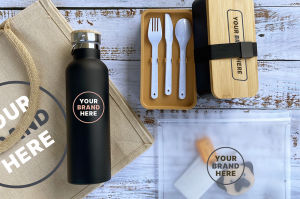Discover the best referral program ideas to encourage word-of-mouth marketing and create brand advocates. Learn how to attract referrals and maximise the power of successful referral programs.
Referral programs are powerful strategies in the world of competitive business. Referrals help businesses expand customer base and foster brand loyalty. Also known as customer referral programs and referral marketing, these programs use satisfied customers as brand advocates to help attract new customers and advocates.
In this blog, we explore the definition and importance of customer referral programs. We also highlight the benefits and cover various topics, including choosing the right referral incentives like express products, developing referral program guidelines, maximising referral reach and implementing referral ideas such as promotional product incentives.
If you’re ready to dive into the world of customer referral program ideas and unlock your business potential through customer advocacy, continue reading below.
Understanding Referral Programs

Businesses use referral programs as a strategic way to encourage existing customers to refer new customers. These programs influence word-of-mouth marketing which helps current customers share their positive experiences with their network. By rewarding loyal customers for successful referrals, businesses can earn customers’ trust, build relationships and attract new customers.
Understanding the Psychology of Referrals and Word-of-Mouth Marketing
Word-of-mouth marketing has a significant impact on consumer behaviour. According to Semrush statistics, 90% of consumers are likelier to trust a recommended brand from friends and strangers. People listen to those they know and respect, making referrals a powerful driver for attracting new customers.
Referral programs capitalise on the psychology behind the social proof – whereby individuals rely on the actions and opinions of others when making decisions. Word-of-mouth marketing reduces barriers to conversion by helping the consumer enter the customer journey with a pre-existing (positive) perception of the brand.
The Key Elements for a Successful Referral Program
Several key elements need to be considered when creating a referral program:
Clarity and Simplicity
The referral program needs to be easy to understand and simple to participate in. The requirements should be easy to grasp.
Attractive Incentives
Offer attractive incentives to your target audience. This may take some research, but essentially it encourages active participation in the referral campaign by motivating current customers to join in and refer the business to their friends and family.
Communication and Promotion
Provide clear instructions so customers can proactively refer others to your business’s benefits. Increase engagement and participation with regular communication and reminders.
You can create a successful referral marketing strategy by incorporating these key elements.
Next, we explore the best referral program ideas to try in your business, the importance of choosing the right incentives, guidelines for creating a referral program structure and strategies to maximise referral reach.
Different Types Of Referral Programs

Referral programs are a powerful marketing strategy that leverages satisfied customers to help businesses grow. There are different types of referral programs, including customer, employee, and partner referrals. Let’s dive into each type, their benefits, and how to start a referral program that aligns with your goals.
Customer Referral Programs
Customer referral programs incentivise existing customers to refer their friends, family, or colleagues, turning them into new customers. Customers are given a referral process, often involving sharing a unique link or code. When the referred customer takes a specific action, like making a purchase, the referrer is rewarded for their successful referral.
Successful Customer Referral Programs
Many businesses have implemented successful customer referral programs, harnessing the power of word-of-mouth marketing. These programs have increased customer acquisition, stronger loyalty, and higher lifetime value. For instance, Tesla, the electric car manufacturer, designed a unique referral program that rewarded customers with incentives like discounts on future purchases and exclusive event invitations. This program not only generated customer referrals but also fostered a sense of community among Tesla owners, enhancing brand loyalty and advocacy.
Employee Referral Programs
Employee referral programs tap into the power of internal networks by encouraging employees to refer potential customers or job candidates. These programs rely on employees’ knowledge and enthusiasm, as they have a deeper understanding of the company’s products or services. Employee referrals can result in higher-quality leads, improved conversion rates, and increased employee engagement.
Tips for Implementing Effective Employee Referral Programs
To create successful employee referral programs, businesses should provide clear guidelines and incentives to motivate employees. Effective communication about the benefits of participation and streamlining the referral process is crucial. Additionally, recognising and rewarding employees for successful referrals can further encourage their engagement and active participation.
Partner Referral Programs
Partner referral programs involve collaboration with strategic partners, such as complementary businesses or affiliates, to refer customers to each other. By tapping into each partner’s customer base, companies can expand their reach and acquire new customers more effectively. These programs require establishing mutually beneficial relationships and aligning goals and incentives.
Best Practices for Partner Referral Programs
To ensure the success of partner referral programs, businesses should establish clear communication channels. Define referral processes and provide incentives that motivate partners to actively refer customers. Nurturing these partnerships is essential to maintain transparency and assess the program’s performance. The choice of referral program depends on the business model, target audience, and objectives.
Remember, referral programs are a valuable tool for businesses to tap into the power of their customers, employees, and partners. By implementing the right program and following best practices, you can unlock growth opportunities and achieve your business goals.
Choosing the Right Referral Incentives

Understanding the Role of Incentives in Referral Programs
The right incentives can motivate customers to participate in referral programs and actively refer others. Offering attractive and targeted rewards, such as promotional products, can boost engagement and enhance brand loyalty.
Incentives are a tangible way to recognise customers’ efforts in promoting the business. Businesses should consider the preferences and interests of their target audience when choosing incentives for their referral program.
There are three types of incentives: Monetary, non-monetary or a hybrid, where both monetary and non-monetary incentives are combined. All three are effective depending on the customer base and referral campaign goals. Whether it’s exclusive discounts, free gifts, promotional products or cash rewards, the right incentive will encourage customers to become brand advocates. Choosing the right incentives thoughtfully, with your customer’s front of mind, can significantly enhance the success of your referral program.
Types of Incentives: Monetary, Non-Monetary, and Hybrid
When deciding on incentives for referral programs, businesses can explore monetary, non-monetary, or hybrid options.
- Monetary incentives include cash rewards, discounts, or credits that customers can redeem for future purchases.
- Non-monetary incentives encompass free gifts, exclusive access, or special experiences that hold intrinsic value for customers.
- Hybrid incentives combine elements of both monetary and non-monetary rewards, providing a versatile and enticing proposition.
Factors to Consider When Selecting Incentives for Your Audience
Choosing the right incentives requires a deep understanding of your target audience. Consider factors such as their preferences, motivations, and demographics. Assess whether monetary rewards or non-monetary perks align better with their interests. Additionally, evaluate the value proposition of the incentive relative to the desired action and conduct a cost-benefit analysis for your business.
Examples of Successful Incentive Structures in Referral Programs
Numerous referral marketing programs have successfully implemented various incentive structures. Cash rewards or discounts on future purchases are commonly used, as they provide customers with a direct and tangible benefit. Free gifts or exclusive access to premium features can also serve as excellent referral program ideas, creating a sense of exclusivity and enhancing customer satisfaction. Moreover, some businesses have leveraged affiliate programs, offering commission-based incentives to customers who refer friends or generate sales.
For instance, Amazon’s affiliate program, Amazon Associates, allows website owners and influencers to earn commissions by referring customers to purchase products on Amazon. This incentive structure created a mutually beneficial partnership, driving traffic and sales for both Amazon and the affiliates.
By carefully selecting and implementing the right incentives, businesses can maximise the effectiveness of their referral programs, motivating customers to actively participate, refer friends, and become loyal advocates for the brand. In the following sections, we will discuss guidelines for creating referral program structures, explore referral program ideas, and strategies to expand the reach and impact of your referral program.
Establishing Program Rules and Guidelines

When creating a referral program, it’s crucial to have clear and concise rules and guidelines. Define the eligibility criteria, referral process, and any specific requirements for participation. By setting these guidelines, businesses ensure transparency, consistency, and fairness for both referrers and referred customers.
Setting Clear Goals and Expectations
Before launching a referral program, it’s important to define clear goals and expectations. Determine what you aim to achieve through the program, such as increasing customer acquisition, driving sales, or expanding brand reach. Establish specific targets and key performance indicators (KPIs) to measure the program’s success and align your strategies accordingly.
Designing a User-Friendly Referral Process
Simplicity and ease of use are vital when designing the referral process. Create a user-friendly experience that minimises barriers and friction for referrers and customers. Utilise intuitive interfaces, provide clear instructions and optimise the referral process for various channels such as email, social media, or direct links.
Tips for Tracking and Measuring Referral Program Success
Follow these steps to assess the effectiveness of your referral program:
- Implement robust tracking and measurement mechanisms.
- Utilise referral program software or referral marketing software to monitor key metrics, such as the number of referrals, conversions, and revenue generated.
- Regularly analyse the data to gain insights into program performance, identify areas for improvement, and make data-driven decisions.
By following these guidelines, businesses can establish a well-defined referral program that encourages customer referrals, enhances customer engagement, and achieves the desired program objectives. In the subsequent sections, we will explore additional referral program ideas and strategies to maximise the reach and impact of your referral program.
Referral Program Ideas

Referral programs thrive on creativity and incentives that attract both referrers and referees. Incorporating these customer referral program ideas into your referral marketing strategy can enhance engagement and drive successful referrals.
Creative Incentives
- Exclusive Discounts or Promotions:
Offer special discounts or promotions to both referrers and referees, creating a sense of exclusivity and value for their participation. - Free Samples or Trials:
Provide referrers and referees with free samples or trials of your products or services, allowing them to experience the value firsthand.Useful incentivised products like custom bags are a popular option. - Cash Rewards or Referral Bonuses:
Incentivise referrals with cash rewards or bonuses, giving referrers a tangible benefit for their efforts. - Gift Cards:
Reward referrers with gift cards to popular retailers or online platforms, allowing them to choose their own rewards.
Tiered Rewards System
- Graduated Incentives:
Implement a tiered rewards system where referrers earn increasing rewards based on the number of successful referrals they make. - Levels or Tiers:
Create different levels or tiers within the referral program, offering higher rewards and exclusive benefits to referrers as they progress. - Exclusive VIP Benefits:
Recognise and reward top referrers with exclusive VIP benefits, such as personalised experiences or early access to new products or features.
Contest and Sweepstakes
- Referral Contest:
Run a contest where top referrers have a chance to win attractive prizes based on the number of referrals they generate. - Sweepstakes Entry:
Provide both referrers and referees with entry into a sweepstake, giving them the opportunity to win valuable prizes. - Grand Prize Draw:
Set a milestone achievement and hold a grand prize draw for those who reach or exceed the referral goal.
Loyalty Points and Rewards
- Earn Loyalty Points:
Offer referrers the opportunity to earn loyalty points for each successful referral they make. - Redeemable Rewards:
Allow referrers to redeem their accumulated points for discounts, freebies, or personalised products. - VIP Status:
Grant referrers VIP status, granting them additional perks and benefits for their loyalty and ongoing referrals.
Social Sharing and Viral Campaigns
- Encourage Social Sharing:
Prompt referrers to share their referral links on social media platforms, expanding the program’s reach. - Bonus Rewards for Engaging Referrals:
Offer bonus rewards for referrals that generate high engagement, such as likes, comments, or shares. - Creative Hashtags and Challenges:
Create unique hashtags and social media challenges that align with the referral program, fostering virality and increasing visibility.
Gamification Elements
- Points-Based Referral Systems:
Implement a points-based referral system with leaderboards to tap into the competitive spirit of referrers. - Achievements and Badges:
Award referrers with achievements and badges for hitting referral milestones, motivating them to strive for more. - Interactive Games or Quizzes:
Incorporate interactive games or quizzes related to the referral program, making the experience more engaging and enjoyable.
By implementing these referral program ideas, you can incentivise customers, foster brand advocacy, and maximise the effectiveness of your referral marketing strategy.
Maximising Referral Program Reach: Brand Advocacy and Promotional Products

In this section, we’ll explore how businesses can make their referral programs reach more people. We’ll focus on brand advocacy and the strategic use of promotional products. By empowering brand advocates, providing branded content, and encouraging user-generated content, businesses can expand the program’s reach.
Promotional products are also important as they reinforce brand visibility and enhance the referral experience. So, let’s dive in and learn how to maximise the success of referral programs through brand advocacy.
Leveraging Brand Advocacy
To make your referral program reach more people, it’s important to harness the power of brand advocates. These are satisfied customers who can share their positive referral experiences and help spread the word about your brand.
Empowering Brand Advocates
Encourage advocates to share their referral experiences with their friends and family. Highlight the benefits and positive outcomes they have achieved to inspire others.
Providing Branded Content and Resources
Equip your advocates with branded content, such as social media posts, emails, or testimonials. This makes it easy for them to share consistent brand messaging with their networks.
Encouraging User-Generated Content
Encourage advocates to create their own posts, videos, or reviews about your brand and their referral experiences. This not only amplifies your message but also adds authenticity and credibility.
Promotional Products as Incentives
Promotional products can be effective incentives in referral programs. They provide tangible rewards that resonate with your audience and reinforce your brand.
- Branded Merchandise as Referral Rewards:
Offer branded merchandise such as apparel, accessories, or lifestyle products as referral rewards. These items not only reward advocates but also act as walking advertisements for your brand when worn or used by referred friends. - Customised Products:
Customise promotional products with your logo, tagline, or unique design elements to align them with your brand and target audience. This personalisation enhances the perceived value and reinforces brand recognition. - Useful and Unique Promotional Items:
Choose promotional products that are both useful and unique. These items stand out and create a positive impression. Valuable items like tech gadgets, drinkware, or eco-friendly products are more likely to be retained and used by recipients. - Incorporating Promotional Products:
Integrate promotional products into your referral program by including them in referral program kits or welcome packages. This adds an extra element of excitement and enhances the overall referral experience.
Effective communication is key to the success of your referral program. By crafting compelling messaging, you can capture your audience’s attention and motivate them to participate.
By leveraging the advocacy of your satisfied customers and using promotional products as incentives, you can maximise the reach and impact of your referral program. Next, we’ll explore additional strategies for optimising and measuring the success of your referral program.
Choosing the Right Channels for Promoting Referral Programs

Selecting the proper channels to promote your referral program is crucial for reaching your audience. Use email, social media, and your website strategically to maximise visibility.
Engaging and Motivating Referrers and Referees
Clear instructions, enticing rewards, and excitement foster engagement and motivation in the referral program.
Streamlining Communication with Automation and Technology
Automation and technology simplify communication throughout the referral process. Use referral program software, personalised links, and automated notifications for efficiency.
By implementing effective communication strategies, businesses can promote their referral program, engage participants, and streamline the process.
Referral Programs in Influencer Marketing

Influencer marketing is a powerful strategy for engaging target audiences. Benefits include increased brand visibility, credibility, and access to niche markets.
Integrating Referral Programs into Influencer Marketing
By integrating referral programs into influencer campaigns, businesses can amplify impact and generate more referrals.
Strategies for Leveraging Influencers
Provide clear instructions, align rewards with their audience’s interests, and equip them with program information and personalised products/uniforms.
Harnessing the Power of Influencer Marketing
By combining influencer marketing and referral programs, businesses can tap into a more comprehensive network, increase brand advocacy, and generate referrals.
Case Studies of Successful Referral Programs

Case studies provide insights into successful referral strategies used to acquire new customers.
- Dropbox’s referral program offered additional storage space, rapidly growing its user base.
- Airbnb incentivised referrals with travel credits, driving customer acquisition and enhancing trust.
- Uber’s referral program used referral codes and free rides to turn riders into advocates, contributing to global growth.
- Tesla rewarded customers with exclusive experiences, fostering loyalty and exclusivity.
Analysing these examples helps structure successful referral programs.
Key Success Factors
- Compelling incentives
- Effective messaging
- Seamless experience and
- Customer engagement.
Actionable Takeaways:
Apply word-of-mouth to attract and retain customers. Referral programs impact customer acquisition, loyalty, and potential.
Additionally, referral program statistics showcase the impact and effectiveness of such programs. Acquiring paying customers, increasing customer loyalty, and maximising the potential of referred customers. We can all learn from successful businesses to optimise our referral programs.
Best Practices for Running Successful Referral Programs

Tips for Running a Successful Referral Program:
- Set Clear Goals
Define specific goals for your referral program, like getting more customers or boosting sales.
- Create Clear Guidelines
Make sure participants understand the program rules, including who can participate and how referrals work.
- Offer Compelling Incentives
Motivate customers to refer others by providing attractive rewards like discounts or personalised benefits.
- Communicate Effectively
Spread the word about your program through email, social media, and your website. Explain how to refer others and highlight the benefits.
- Avoid Common Mistakes
Keep your messaging consistent and follow up with referrers and referees. Promote your program actively to get more participants.
- Continuously Improve
Track the program’s performance using metrics like conversion rates and customer value. Gather feedback to make necessary adjustments.
By implementing these tips, businesses can run successful referral programs. They can reward loyal customers, attract new ones, and benefit from word-of-mouth marketing.
Harnessing the Power of Referral Marketing for Sustainable Growth

Referral programs have incredible potential for driving customer acquisition and business growth. They foster loyalty and help businesses expand their reach in a cost-effective way.
By rewarding loyal customers for their referrals, businesses can create a cycle of advocacy. Loyal customers become brand advocates, driving more referrals and generating new sales opportunities.
Referral marketing is a timeless and effective strategy. Consumers trust personal recommendations, making referrals a powerful tool. By embracing technology and staying updated on consumer behaviours, businesses can optimise their referral programs for maximum impact.
If you’re looking to shape the future of your business, consider implementing a referral program. It can boost customer engagement, increase sales, and cultivate a loyal customer base. Start planning your own referral program today, rewarding customers for successful referrals and propelling your business towards sustainable growth.
Ready to supercharge your referral program? Contact Payless Promotions today and discover how our wide range of promotional products can take your brand advocacy to the next level. Check out our website now to explore our offerings and leverage the power of referrals for your business success.
